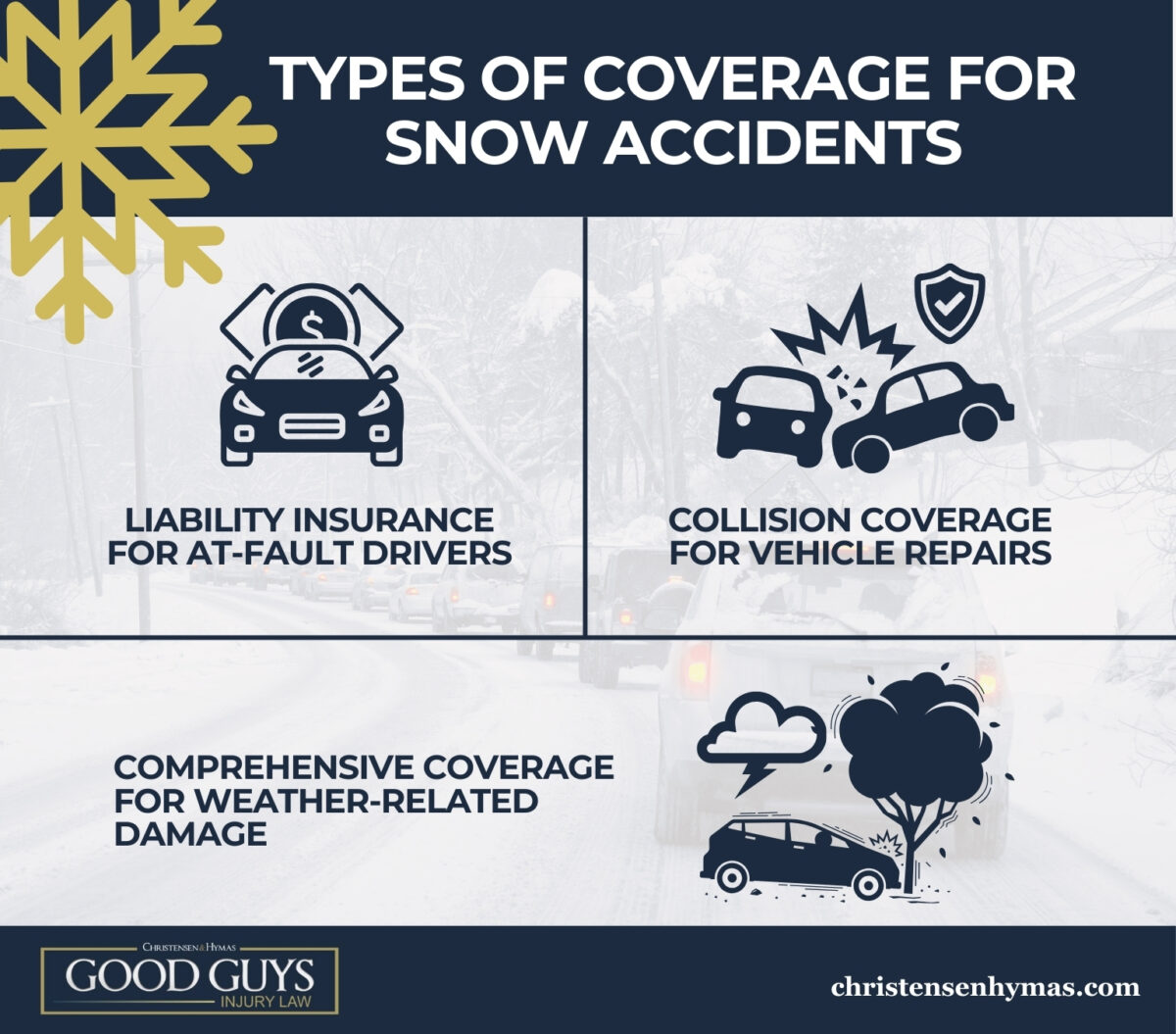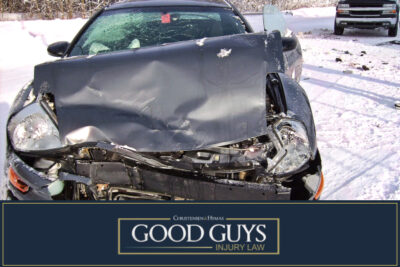
Snow-covered roads can make driving far more dangerous than usual. Ice, slush, and poor visibility increase the odds of collisions during winter weather. Many wonder how insurance coverage applies when a car accident is caused by slippery roads or drifting snow. With the right information, you can better understand what types of car insurance help you recover from these winter weather accidents.
At Good Guys Injury Law, we provide the tools you need to protect yourself. Car accidents often arise when drivers face bad weather due to limited control and longer stopping distances. Insurers treat these crashes like any other incident, but fault and coverage depend on policy details.
You may have to pay for repairs and medical bills after a snowy crash if you carry strong insurance coverage. Before making assumptions, check your policy and learn how different forms of insurance pay for winter damage.
Table of Contents
Types of Coverage for Snow Accidents

Different policies protect against various losses, so knowing which coverage you have helps you decide how to proceed. Some forms focus on the damage you cause to others, while others protect your own vehicle. Each policy type fits into the larger picture of car insurance.
Liability Insurance for At-Fault Drivers
Liability insurance helps pay for damage and injuries you cause to others if you are involved in an at-fault accident. If winter weather makes you slide into another car, your liability coverage may help pay for their repairs and medical care. This coverage does not pay for your own vehicle or your injuries. According to Utah Code §31A-22, Utah requires minimum liability insurance, but buying more can offer stronger protection.
Collision Coverage for Vehicle Repairs
Collision coverage, sometimes called collision insurance, pays for damage to your vehicle when it collides with another object, regardless of fault. If you lose control on an icy road and hit a tree, collision coverage helps repair your car. This policy type works even if another driver is not involved. Remember that you must pay your deductible before your insurance pays for repairs.
Comprehensive Coverage for Weather-Related Damage
Comprehensive coverage protects against non-collision events like falling tree branches or damage from hail. During harsh winter weather, ice storms or heavy snow can harm your vehicle. Comprehensive coverage may step in if a branch breaks under the weight of snow and cracks your windshield. Unlike collision coverage, it focuses on events not directly caused by another car’s crash.

Looking for a Personal Injury Attorney? Contact Good Guys Injury Law Today!
Factors That Influence Coverage in Snow Accidents

Not every snowy crash leads to a smooth insurance claim. Variables like fault, limits, and deductibles shape how much help you receive. Awareness of these factors can guide you in handling your claim. Remember always to put safety first when you get behind the wheel, and check out a few factors affecting your coverage, including:
Determining Fault in Weather-Related Crashes
In bad weather, drivers must take extra care. You may be held responsible if you fail to adjust your speed or following distance and cause a crash. Insurers and police review conditions, vehicle positions, and road reports to decide who caused the accident. Proving negligence in poor weather can be tricky, but careful evidence-gathering helps establish responsibility.
Impact of Policy Limits on Claims
Your policy has limits that cap how much the insurance company pays. You may pay out of pocket if repairs or medical bills exceed these amounts. Higher limits offer better protection but cost more. Before winter hits, review your policy to ensure you have enough coverage.
Role of Deductibles in Snow Accident Claims
Deductibles are the amounts you pay before insurance coverage applies. Lower deductibles cost more in monthly premiums, while higher deductibles reduce monthly costs but require more out-of-pocket spending after a crash. In winter, when accidents spike, consider if your deductible amount fits your comfort level. Choosing wisely affects your finances when filing insurance claims.
Common Issues in Snow Accident Insurance Claims
Even with proper coverage, you may face hurdles in getting paid. Disputes over blame, delayed processing, and coverage exclusions often arise. Learning about these challenges prepares you to handle them more effectively. A few common issues affecting snow crash claims include:
Disputes Over Fault in Multi-Vehicle Collisions
When several cars collide on icy roads, determining fault can grow complex. Drivers may blame each other or the conditions, creating lengthy investigations. Insurers analyze police reports, witness statements, and physical evidence to identify who shares responsibility. Patience and proper documentation help resolve these disputes fairly.
Delays Due to High Volume of Winter Claims
Winter storms can lead to a surge in car accidents and claims. A busy season may slow the handling process, leaving you waiting for repairs or settlements. Communicate regularly with your insurer and follow up if progress stalls. Persistence can help ensure your claim is not overlooked during the busy season.
Denied Claims Due to Policy Exclusions
Some policies exclude certain types of weather-related damage or only cover costs if specific conditions are met. Your insurer may deny your claim if you lacked proper maintenance or drove recklessly. Review your policy’s language to avoid unpleasant surprises. If unsure, seek clarification before relying on coverage.
How a Lawyer Can Help With Snow Accident Claims

Sometimes, handling your claim alone proves difficult. A skilled attorney knows the rules, negotiates with insurers, and looks for your best interests. A few of the top ways we can help you include:
- Evaluating your policy. An attorney can review your car insurance terms. They explain what applies to your situation and how to leverage your liability coverage effectively.
- Gathering evidence. Lawyers collect photos, records, and witness statements. This solid foundation supports your claim and challenges unfair denial.
- Negotiating with insurers. Dealing with an insurance company can be tough. A lawyer speaks on your behalf, pushing for a fair outcome.
- Fighting unjust denials. If your claim is wrongly rejected, your attorney can push back. They know when policies are misread or misapplied.
- Representing you in court. If negotiations fail, an attorney can file a lawsuit. They guide you through the legal process and protect your rights.
With professional help, you stand a better chance of a fair settlement. Getting support early in the process can prevent long, frustrating battles.
Contact Good Guys Injury Law for Your
Dog Bite Case


Call Our Utah Car Accident Attorney for a Free Case Consultation

You deserve peace of mind after a car accident caused by harsh winter weather. At Good Guys Injury Law, our team has the knowledge and experience to answer your questions and help you know your options. We are here to meet with you, act as your advocate, and ensure your rights are protected, as we do for our clients. Contact us today to learn more about how our team can help you.
